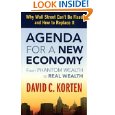
Agenda for a New Economy: From Phantom Wealth to Real Wealth
Today's economic crisis is the worst since the Great Depression. However, as David Korten shows, the steps being taken to address it do nothing to deal with the reality of a failed economic system. It's like treating cancer with a bandage. Korten identifies the deeper sources of the failure: Wall Street institutions that have perfected the art of creating “wealth” without producing anything of real value: phantom wealth. Our hope lies not with Wall Street, Korten argues, but with Main Street, which creates real wealth from real resources to meet real needs.
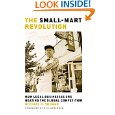
The Small-Mart Revolution: How Local Businesses Are Beating the Global Competition
In “The Small-Mart Revolution, Shuman makes a compelling case for his alternative business model, one in which communities reap the benefits of “going local” in four key spending categories: goods, services, energy, and finance. He argues that despite the endless media coverage of multinational conglomerates, local businesses give more to charity, adapt more easily to rising labor and environmental standards, and produce more wealth for a community. They also spend more locally, thereby increasing community income and creating wealth and jobs.
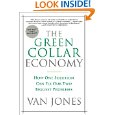
The Green Collar Economy: How One Solution Can Fix Our Two Biggest Problems
As the “ecological crisis nears the boiling point,” human rights activist and environmental leader Jones (president of the national organization Green For All) lays out a visionary, meticulous and practical explanation of the two major challenges the U.S. currently faces-massive socioeconomic inequality and imminent ecological catastrophe-and how the current third wave of environmentalism, the “investment” wave, can solve both. If industry players want to take advantage of growing consumer demand for green solutions, they'll have to follow principles of inclusiveness as well as conservation and inventiveness to create “broad opportunity and shared prosperity” for citizens at all levels of society.
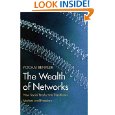
The Wealth of Networks: How Social Production Transforms Markets and Freedom
This book could well be the manifesto for 21st Century of Informed Prosperous Democracy. It is a meticulous erudite discussion of why information should not be treated as property, and why the “last mile” should be built by the neighborhood as a commons, “I'll carry your bits if you carry mine.” The bottom line of this book, and I will cite some other books briefly, is that democracy and prosperity are both enhanced by shared rather than restricted information.
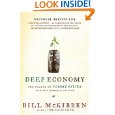
Deep Economy: The Wealth of Communities and the Durable Future
DEEP ECONOMY is a very fine personal effort with a very straight-forward prescription for localizing food production, energy production, radio, and currency. The author is a gigantic intellect, and writes clearly.
The core point in the first part of the book is an emphasis on a need to restore humanity to the process, to reduce industrial era efficiencies in order to enable more intangible values such as community.
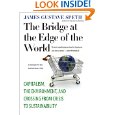
The Bridge at the Edge of the World: Capitalism, the Environment, and Crossing from Crisis to Sustainability
In Speth's view, the accelerating degradation of the Earth is not simply the result of flawed or inattentive national policies. It is “a result of systemic failures of the capitalism that we have today,” which aims for perpetual economic growth and has brought us, simultaneously, to the threshold of abundance and the brink of ruination. He identifies the major driver of environmental destruction as the 60,000 multinational corporations that have emerged in the last few decades and that continually strive to increase their size and profitability while, at the same time, deflecting efforts to rein in their most destructive impacts.



